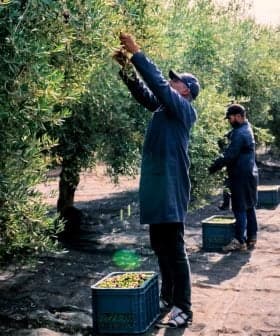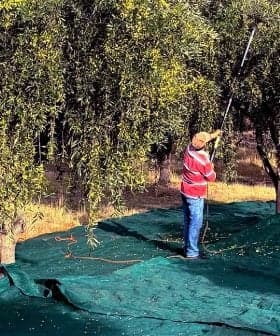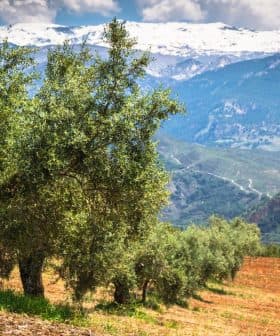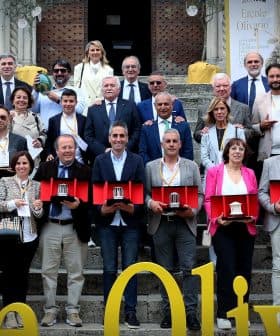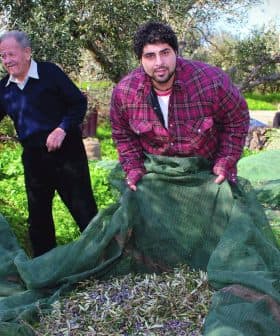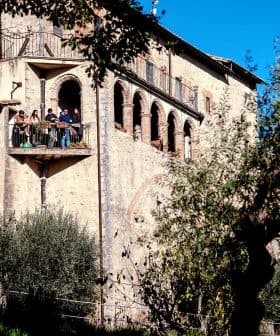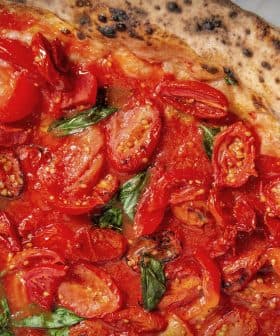Calabrian Cooperative Emphasizes Quality While Building Economies of Scale
Seventeen olive oil producers have joined to promote Carolea extra virgin olive oils while driving down farming and milling costs.
 Producers of the Dea Carolea cooperative (Photo: Dea Carolea)
Producers of the Dea Carolea cooperative (Photo: Dea Carolea) Olive farmers in Calabria, Italy have begun the harvest, with a focus on quality over quantity this year according to the Dea Carolea project coordinator. Dea Carolea is an experimental cooperative aiming to collectively elevate high-quality extra virgin olive oil on the global market by adhering to strict production protocols and certifications.
Olive farmers in Calabria, Italy’s second-largest olive oil-producing region, have already begun the harvest.
“While we do not anticipate large volumes this year, we expect a top-quality product,” said Valeria Minasi, coordinator of the Dea Carolea project in the southwestern Italian region.
Dea Carolea is an experimental cooperative formed by local olive oil producers. The goal is to achieve economies of scale, optimize agronomic practices and collectively elevate their high-quality extra virgin olive oil on the global market.
A distinctive feature of this crop is its exceptionally high final olive oil yield, unmatched by others, even with early harvesting… It is a highly appreciated olive oil with a nearly intense medium fruity profile.
Dea Carolea is a play on words that merges the Italian word for goddess, dea, with Carolea, the olive variety that has long dominated the plains of Lamezia Terme.
Under the Dea Carolea brand, participating growers adhere to strict production protocols and olive oil certifications.
The Dea Carolea project expands on the work of producers already operating within the Lametia Protected Designation of Origin certification, which applies to olive oil produced in Lamezia Terme.
See Also:Unidentified Issue Triggering Early Fruit Drop in Northern ItalyNumerous olive growers manage small and medium-sized orchards across the plain, and some families have been producing olive oil for centuries.
Dea Carolea is promoted as an opportunity for growers to expand their farms, farmhouses and olive oil mills, fostering resilience through collective effort.
“A new generation of olive entrepreneurs who have taken over and revitalized their family businesses are the driving force behind the project,” Minasi said. “For the brand to emerge, as was the case with the renowned Terra di Bari, this heritage and these diverse experiences must converge into a single product.”
According to the project coordinator, 17 producers have already committed to meeting the brand’s PDO standards in part or all of their production.
“Some of our trees are centuries old, while others have been replaced to enhance productivity,” said Maria Cristina Di Giovanni, co-owner of Podere d’Ippolito, a PDO consortium farm and a Dea Carolea project promoter. “However, we avoid intensive or super-intensive farming because this is our landscape and identity.”
“Managing such a beautiful olive grove is not always easy due to the costs involved,” she added. “Century-old trees are more demanding and challenging, and we have faced manpower shortages.”
According to Di Giovanni, the fragmentation and small scale of local olive oil producers have slowed the recognition of Carolea’s extra virgin olive oils.
“Initially, we organized promotions and meetings with buyers and others interested in Lametia PDO olive oil,” Di Giovanni said. “This allowed us to identify potential weaknesses.”
“We realized that joining forces was essential to ensure both quality and quantity,” she added, highlighting the need to meet the demands of the international market.
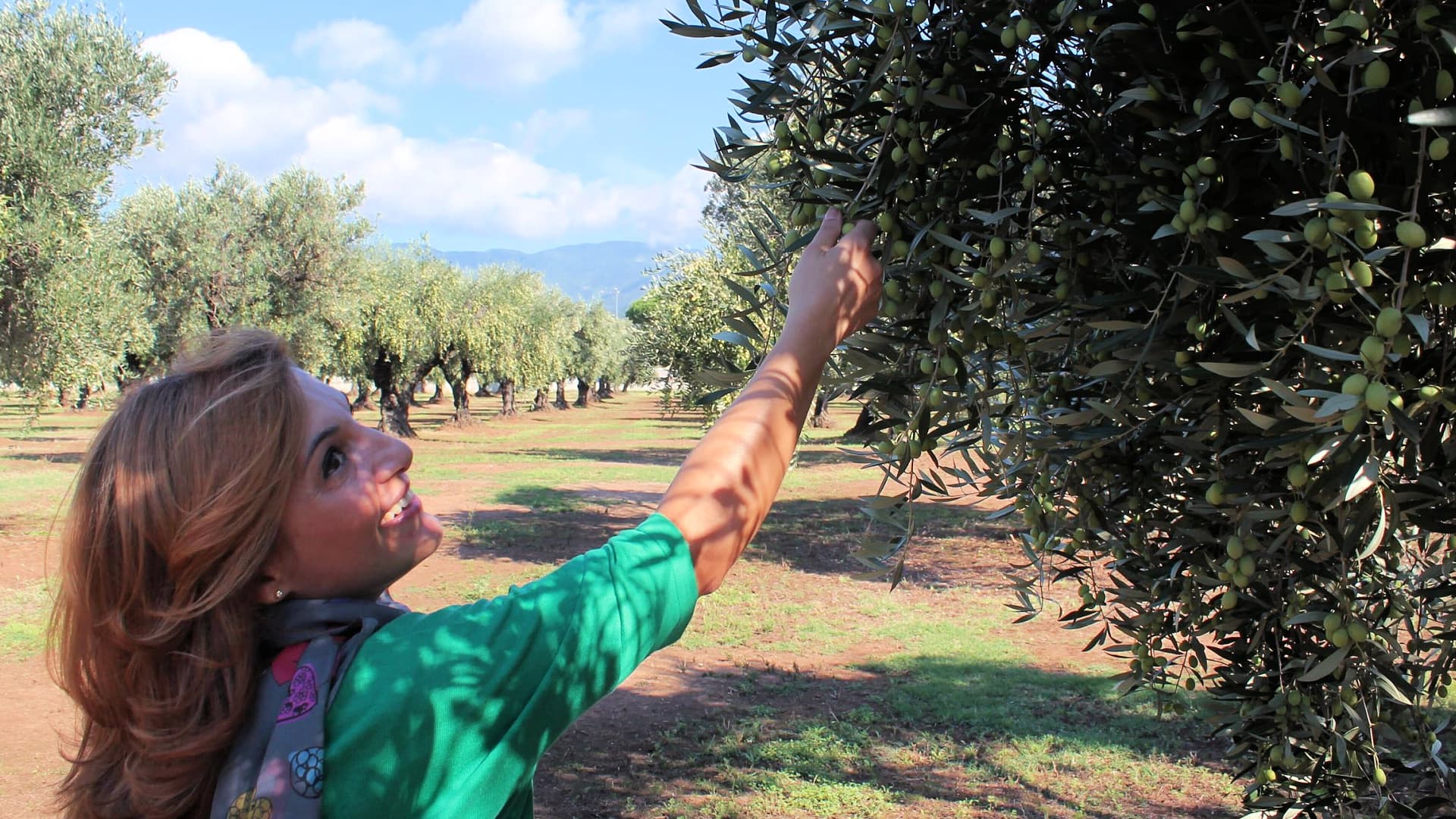
Maria Cristina Di Giovanni believes the Dea Carolea cooperative will help local producers promote Carolea extra virgin olive oil globally. (Photo: Dea Carolea)
In addition to the Lametia PDO guidelines, Dea Carolea provides members with specific procedures to follow.
These procedures ensure access only to PDO-certified extra virgin olive oil, also tested by a certified tasting panel.
“We test every batch submitted to the project that already has a PDO certification,” Minasi said. “Once these batches are blended into a single product, the resulting extra virgin olive oil will also receive its own PDO certification.”
“Additionally, the product undergoes further examination by a certified panel test, after which it becomes a Dea Carolea extra virgin olive oil,” she noted.
Due to the varying agronomic practices of its members, Dea Carolea produces organic and conventional olive oils.
“One example of the standardized procedures is the harvest, which is expected to be in full swing by mid-October,” Minasi explained.
Producers opt for an early harvest to capture the optimal quality of the Carolea cultivar while avoiding potential olive fruit fly infestations.
“A distinctive feature of this crop is its exceptionally high final olive oil yield, unmatched by others, even with early harvesting,” said Antonio Lauro, professional taster and founder of the EVO IOOC Italy olive oil quality competition.
Early harvesting allows Carolea to showcase its optimal health benefits and organoleptic qualities.
“When harvested early, Carolea contains a high level of biophenols, which is not the case when harvested mature,” Lauro said. “The ideal time to harvest is when the olives begin turning from green to yellow, achieving a yield that remains high compared to other cultivars.”
“It is a highly appreciated olive oil with a nearly intense medium fruity profile,” he added. “The cultivar’s characteristic notes include apple, golden apple, and almond, with hints of artichoke and olive leaf often present.”
Carolea’s bitterness is distinctly pronounced, with a medium intensity. “It tends to overshadow the spicy notes, which are also medium intensity but slightly milder,” Lauro said.
Di Giovanni pointed out that acting as a cooperative among the members allows buyers seeking Dea Carolea olive oils to deal with a single point of contact.
“We believe this is the key step forward that we’ve been striving for,” she said. “New producers are emerging, many of whom are young, which is very promising. We are proud that the PDO consortium now includes historical partners and many young women-led businesses.”
Both Minasi and Di Giovanni emphasized that the next step for the project, beyond launching Dea Carolea, is to focus on its further expansion.
“While medium-sized, well-structured companies can benefit from the project, this is especially true for small producers,” Di Giovanni said.
“Collaboration enables greater competitiveness and more advantageous joint acquisitions,” she added. “It also opens up access to funding sources that public policies reserve for company groups, consortia and cooperatives, aligning with the legislator’s direction.”
“Carolea olive oil and table olives are highly significant for Calabria, likely representing 40 to 50 percent of the region’s olive production,” Lauro said. “This crop is quite hardy, though it does suffer from pathogens like peacock’s eye; however, these are manageable even in organic farming.”
“If all goes as planned, the harvest will be completed by October,” Minadi concluded. “Certifications will be issued in November, and Dea Carolea should be available for sale by the end of that month.”
Share this article


